2022 Week 3: Government/Policy
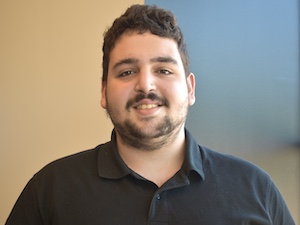 Kerim Bali | Office of Councilmember Mark Conway
Kerim Bali | Office of Councilmember Mark Conway
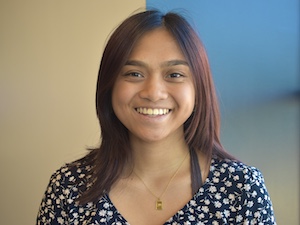 Mikayla Chua | Office of Councilmember James Torrence
Mikayla Chua | Office of Councilmember James Torrence
This week, I had the opportunity to go out into District 7, walking door-to-door in neighborhoods, handing out flyers, and informing people about the upcoming block party at the Mondawmin Mall. It tested my shyness, speaking to any resident out and about the event. The entire office came out in the heat. It was one of my favorite days I’ve gotten to work — as all the chances I’ve gotten to work in person have felt more like a team getting to work in real-time and hear about what the other members are working on. I also got to see more of what the district looks like. Sheena, Director of Constituent Services, had been working on the event for a while now and talked about her experience setting it up with little resources. A lot of learning on this job has been actively listening. Yes listening to constituents of course, but also hearing from my coworkers about how they go about their job, what could be done better, where there is struggle, and their experience and relationships w people in the community. I am constantly learning from my coworkers who have years of experience in local government and lived experience in the community.
Being out in the district, it was also interesting to see how the office attains a keen set of eyes when working. They were constantly proactively looking around and aware, knowing where specific 311 service requests are unfulfilled, but also for any needs that are overlooked or a potential service request. It was a reminder that the service requests did not just come from constituents. The office also takes an active role in being first-hand caretakers of the community. Certain sidewalks had been unfinished and Sheena pointed out overgrown bushes that obstructed alleyways, so they filled out the 311 SR’s themselves. There was a moment in a neighborhood where a moving car hit a chunk of the median, and chunks of concrete and rock flew across the street nearly hitting us. We surveyed the damage, helped Sheena move the debris off the road, and input a SR.
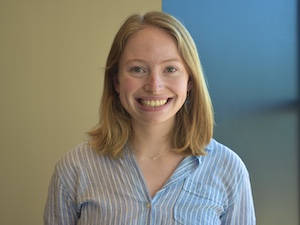 Sigrid Edson | Mayor’s Office of Immigrant Affairs
Sigrid Edson | Mayor’s Office of Immigrant Affairs
On a good day of virtual work for MIMA, I start off with some housekeeping. I open my calendar, email, and spiral notebook, and make sure I remember all the meetings I’m taking that day. Then, I make myself a to-do list for the day. Usually it includes preparation for each meeting, plus a few tasks or milestones for each of the projects I’m working on — nailing down data presentation for a Baltimore AAPI community fact sheet, updating MIMA’s volunteer handbook, or checking in with the other intern in the office. Now that I’m fully taking over as volunteer coordinator, there are also a few things I do every day, like checking for replies to the volunteer application form or other announcements. I make my way through these tasks between meetings.
On Tuesdays, I begin my day with a check-in with my supervisor, Charlie. It’s nice to catch up after the weekend and make sure I’m on track with my projects, and I like having a designated time to ask questions and set goals for the coming week. Later on Tuesday mornings, the whole MIMA team convenes to share updates and touch base. Oftentimes, I find myself overwhelmed by names and programs and initialisms I’ve never heard of, and I google or drop questions in the chat to try to keep up. Other times — more and more each week — I find myself to be helpful, able to supply information, jump in on a new initiative, or provide support. These are the most gratifying moments: when I feel like a genuine member of the office with my own role to play.
Sometimes, I’ll have other meetings in the afternoon — this past week, I sat in on a call getting feedback on a proposal to form an AAPI advisory group, the bi-monthly Immigrant COVAX Workgroup meeting, and the bi-weekly MIMA COVID-19 Community Stakeholder call. In most of these settings, I am there to learn for my own benefit and to be a better help to the office. Although I have gained a lot of concrete knowledge about how MIMA and other groups implement certain programs, one of my main takeaways from my first three weeks participating in a local government office is more abstract: Everything the government does is actually done by people. Not only that, but it takes huge amounts of coordination and cross-checking to make those things happen. I think it’s common to talk about the government like a monolithic sentient being that can just do whatever it wants, but from the inside it’s clear that decisions — good and bad — are made and implemented by people in many steps. I’m glad to be learning this now, and I hope to keep digging into this theme as the internship continues, especially as it pertains to Baltimore City in particular.
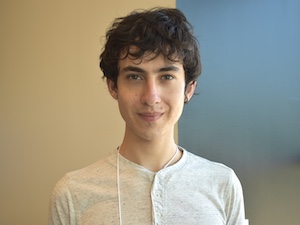 Carlos Gamboa | Office of Councilmember Zeke Cohen
Carlos Gamboa | Office of Councilmember Zeke Cohen
Last week, I spent the evening representing Councilmember Cohen at a community association meeting. By a stroke of luck, my shift ended early that day, granting me a couple hours of free time. I decided to walk to the tavern where the meeting was held so I could explore the area. During my walk, I passed through Fells Point and Little Italy. I noticed that the streets were better paved and vacant houses less common than in the Black Butterfly. The same was true of the neighborhood the meeting was in, except for an abandoned Burger King up the hill. As I crossed the street to the tavern, a trio of “squeegee boys” caught my eye: they were sitting on a low wall outside a Royal Farms, waiting for cars to stop at the light. I watched them chatting for a moment, then slipped into the tavern.
The meeting was held on the second floor, with windows overlooking the street below. I was the first person besides the board to get there: I introduced myself, then sat down at the table next to them. Slowly but surely, members filed in, and by the time the meeting started, there were about twenty people in the room. The session began with brainstorming ways to encourage residents to better maintain their homes and lawns, including monthly awards for the “best block.” This struck me as slightly myopic. Some residents may not keep their property “pretty” due to financial constraints or long working hours, and the members of the community association must pay dues to have a seat at the table. After about half an hour, the conversation veered to a more serious topic: two teenage brothers in the neighborhood had acquired a BB gun and were damaging residents’ property. Previously, the pair had shot out a house’s window, damaged road signs, and lit lawns on fire; however, the tipping point came when they shot a cyclist in the head, leaving a pellet firmly lodged in his helmet.
The community was understandably concerned, but no one knew how to proceed. The police had already detained the brothers multiple times, yet their activities persisted; non-profits tried to intervene, but the family was not interested in cooperating. Residents were now increasing pressure on the police to act decisively, as well as urging me to prioritize it with the councilman. I listened intently, jotting down notes and asking those directly affected to send me more detailed information. I am generally deeply reluctant to contact the police, especially in cases involving children, family issues, and minorities: the boys are Latine, so this situation was especially fragile. That said, the severity of the situation and the failure of non-profits to successfully intervene left me at a loss. I agreed to pass it along to my supervisor, hoping she would know how to handle it.
As the meeting progressed, though, it dawned on me that out of all the attendants, only two were Black and none were Latine: there are just as many White people as Latines in Fells Prospect, along with a significant Black community. The brothers are Latine. Yet, in a community meeting dedicated to their conduct and, ultimately, their future, not only were they not present, but neither was anyone from the Latine community.
On the street below, traffic slowed, and the squeegee boys set to work. I recalled an article I read in the Sun a few weeks ago about the city’s plan to “get them off the streets.” Again, I completely understood drivers’ concerns, as they do not want teenagers touching their cars without permission. Even so, in both cases I had to wonder: will the plan address the factors that led to the current problem? Will the teenagers receive the support they need? And, finally, has anyone asked the teenagers’ immediate community for their input? That said, I was there to help, and I dutifully passed the constituents’ requests up the chain of command. After all, the residents were not truly to blame for the situation. They were facing a dire issue, and all existing systems had failed them: they had not handed the boys the BB gun, nor had they created a society dependent on the police to address family and mental health crises.
When the meeting, I said my goodbyes and promised to come back for the next meeting; then, I went downstairs and walked onto the street. The sun had set, and the squeegee boys were gone. I briefly scanned the block for any sign of them. Finding nothing, I headed home.
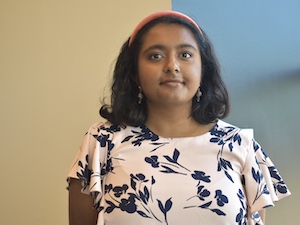 Diksha Iyer | Out for Justice
Diksha Iyer | Out for Justice
I usually arrive at my placement 15 minutes early (since that is when the buses arrive), allowing me some time to ease into my morning routine. I check through my email, check the voicemail, and finish my initial administrative tasks. This way, I can ensure that everyone else who works at my placement has all of the materials/resources needed to have a successful start to their day. Currently, I am working on three main projects: 1) to digitize the reentry forms and letters received from people seeking assistance from OFJ (this will help us streamline everything into the one model that was developed during COVID-19), 2) to research the background and funding of each of the candidates running in the primary election and create an educational tool to use during our civic engagement workshops/distribute to our membership base, and 3) consolidate the data from all of our recorded interactions in the 2021-2022 fiscal year and attend grant language workshops to aid in our July grant applications. Throughout the day, I work on these various projects and communicate with the different program heads to ensure that I am performing to their expectations and provide my own feedback on how I think the processes we are working on can be improved.
Throughout the day, there are several individuals who come into the office. They can be seeking assistance, during which I evaluate their needs and direct them to the proper resources. They can also be volunteers/members of the OFJ organization, so I take the chance to learn about their stories, see how they became involved with the organization, and note down their observations. I often ask them to fill out a policy survey that helps OFJ determine what their members are worried about and, therefore, what we need to address in the next legislative session. This ensures that we are a member-led organization.
Each day brings new challenges, new opportunities, and new stories. On Tuesdays, we usually take in new members, so I spend my day ensuring that we have a method to retain new members, that I am educating them on how to be engaged with the organization, and I am accurately connecting them with the resources they need. For example, we might need to make them an email, evaluate their ability to use a computer, or interview them to we can write them a letter of support. The ways in which we can support our members are varied, so it is essential that I understand them all. I’m excited to see what the primaries will bring, because that is when OFJ will be busiest this summer – hopefully, my educational tool works out well and supports our member base in their voting journey.
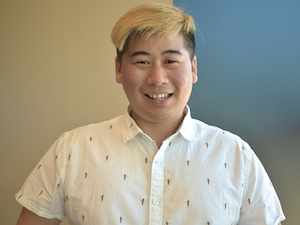 Frank Meng | BCPS Engagement Department
Frank Meng | BCPS Engagement Department
Hi everyone, welcome back to my (b)vlog! Today, I will write about a day in my life as a summer engagement and policy intern at Baltimore City Public Schools. This post mainly talks about my in-person experiences as I work in person for most of the week.
Typically, I would wake up at 8 am, finish my morning routine, and grab a cold brew coffee on my way out to work. I work remotely on Monday and Friday, but when I work in person, my office is located in the opening working area next to the main office. I love it because it’s not only newly renovated but also how collaborative the space is—with no walls or blinds between my colleagues and me. Then, I log on to teams and Asana to check today’s meeting schedule and project agenda to see if there are urgent issues I need to handle immediately. Usually, there will be two to three meetings a day—some are meetings with other departments, and some are collaborative work meetings with my supervisors to align goals and deliverables.
Last week, Dani just returned from her vacation and met with me, talking about some projects she is working on. One of them intrigued me—the e-sport initiatives. I grew up in an Asian household where my parents are pretty strict regarding video games and doubt their value. So, when she talks about e-sport as an enrichment, I have a hard time drawing a positive connection between e-sport and academics. Nevertheless, after an informative discussion and some research, I learned that teachers’ supervision and the careful selection of games could positively affect students’ communication and collaborative teamwork skills. I look forward to supporting her and her team on the new initiatives, helping students thrive and flourish.
Thank you for reading my blog, and I will see you next week! Please like, subscribe, and follow me on all social media @franktimshel
Stay tuned!
